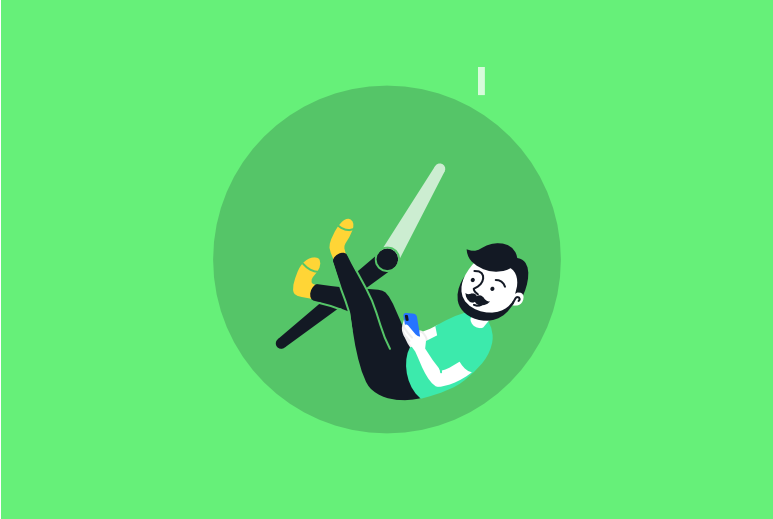For me it is often the endless housework that surrounds me, as I frequently work from home. It always seems far more important to tend to the washing, clean the skirting boards or weed the vegetable patch than to sit down at my desk and write.
In particular, some tasks just seem a lot more difficult to start, so they hang over me day after day; for me, these are job applications (particularly the dreaded selection criteria), grant applications (save me!) or writing journal articles.
It is much easier to contemplate what I’m going to write than to do so, but to actually get me to put pen to paper (or fingers to keyboards), well, maybe I do need to just sort through my sock drawer first …
So this article is my attempt to slay the procrastination beast. I’m going to discuss some techniques that have worked for me and for other colleagues in just getting things done.
One technique to stop procrastinating: Sheer and utter terror
For me, the feeling that I just needed to be finished was a powerful motivator to get to the desk and start writing. And at the desk was where I stayed full time for nine months, as my quadriceps and relationships withered away. But, motivated by sheer fear, finally the job was done.
Deadlines need not be fatal
Externally imposed deadlines
Another technique that works well for me is deadlines. Sometimes these are externally imposed: the job application has to be in, the assignment is due on a certain date, the exam is scheduled—whether you are ready or not.
When things are left to the last minute, however, this can lead to an extreme amount of stress, particularly for those who are very time-poor. For others, urgent unpredictable responsibilities can randomly intrude, such as an ill child or an extra work shift; and these can throw schedules out the window.
‘Leaving things to the last minute when you have a young family is horrific. Every time I am writing a grant it happens and my relationship is pushed to the limit. I feel terrible about it but I think it’s hard wired in me’, says one Australian researcher, who wishes to remain anonymous.
Internally imposed deadlines
For those of us who work well to deadlines, self-imposing a deadline can be helpful.
I often ask my co-workers to give me deadlines to help things get in on time, or if they are reluctant to do so, I will email a self-imposed deadline to a colleague myself. This not only keeps my different projects ticking along, but also ensures that I can check my work schedule and allocate time to the task.
Because I don’t like to break my word, an email to a colleague promising a piece of work is often all I need to get the work done in a timely fashion.
Of course, if you are working in an office, you can make a commitment in person. ‘I used to do this with a co-worker, so we’d both be (kind of) accountable for our day’s progress’, says Dr Lauren Edwards, research assistant in the Animal Welfare Science Centre at the Faculty of Veterinary and Agricultural Science at the University of Melbourne.
Commitment contracts to stop procrastination
If you are reluctant to involve a colleague, you can get more serious using commitment contracts, a concept developed and researched by the economics, business and law academics Professor Dean Karlan, Professor Barry Nalebuff and Professor Ian Ayles of Yale University (Ashraf, Karlan and Yin 2006). Their website, www.stikk.com, accepts pledges of cold hard cash in return for a commitment. You can also nominate external referees, such as colleagues or friends, to keep you honest.
If you default on your commitment, then the cash is donated to a nominated charity. To add spice to the commitment, you can nominate an organisation you hate—for example, you could nominate a racist political party or a lobby group promoting smoking in developing countries. That way if you default, you will be contributing money to a cause you cannot stand.
What could be more motivating than ensuring your money doesn’t go to the ‘campaign to encourage smoking in primary school age children in Guatemala’? If you achieve your goal, the money is returned to you (minus a small service charge).
Other similar systems that might work for you include beeminder or habitica.com, where your progress is translated into achievements, or punishments, in a role-playing game.
Mark Twain’s tip for avoiding procrastination: Chowing down on the amphibian
The concept of ‘eating the frog’ is attributed to Mark Twain, who said if the first thing you do each morning is to eat a live frog, then you’ve done the most difficult thing of the day, and everything else will be easy.
Essentially, if you choose to do the thing that is most difficult first, when you are motivated and fresh, then any other tasks for the day will be easy. By eating the frog, ‘you feel like you’ve had a productive day even if you get nothing else done’, says Dr Alison Peel, postdoctoral research fellow at Griffith University.
Breaking small tasks down: The Pomodoro Technique
Of course we know that breaking an intimidatingly large task down into small achievable chunks has merit, so much so that apparently you can write a thesis in only 10 minutes a day.
The Pomodoro Technique is a time-management system that breaks work times into intense 25-minute intervals with short scheduled breaks of 3–5 minutes in between. Every four pomodoros, you can take a longer break of 15–20 minutes.
The technique has been used in computer programing teams to maximise workflow efficiency (Gobbo and Vaccari 2008). The idea here is that you pick up momentum and become immersed in the task (‘flow’ or getting into ‘the zone’), which becomes easier and easier.
Another useful technique might be to have a specific amount of time allocated with hard boundaries, such as scheduling the task between meetings, a technique suggested by Dr Emma Burrows, researcher in behavioural neuroscience at the Florey Institute: ‘The last 15 minutes before a meeting can be really, really productive!’
Alternatively, you can make a list of ‘productive procrastination tasks’ that you can use when you find your mind wandering away from your main task. This means that you still manage to achieve something, even if your mind is losing focus.
‘If I notice myself wasting time, [I] switch to something else that is a bit easier to get done, and then move back to whatever I was wasting time on later when I am feeling it a bit more’, says Dr Suzanne Nielsen of the National Drug and Alcohol Research Centre, University of New South Wales.
Use that precious time
Of course, even if you have time allocated to a task, the most important thing is actually achieving what you set out to do, rather than simply spending time at a desk. Reducing distractions and focusing on what you need to achieve in the allocated time is critical to getting the task done.
A 2005 study by Mark and colleagues showed that skilled workers in an office setting have highly fragmented days. In this study, an average of 57% of tasks were interrupted with the average length of time spent working before being interrupted or switching tasks being only 11 minutes and 4 seconds.
Interestingly, in this study, ‘external interruptions’ (e.g. environmental events, such as a phone ringing, a colleague entering one’s office, or an email or text message signal) were particularly disruptive; whereas ‘internal interruptions’ (e.g. taking a break or thinking about another pressing subject) were beneficial perhaps because they allow ideas to incubate (Mark, Gonzalez and Harris 2005).
Reducing external interruptions can be as simple as turning off social media and email, turning your phone off or to the ‘do not disturb’ mode, taking your office phone off the hook, putting on noise reduction headphones with calming music, closing the office door or moving locations to become harder to find (decamp to the library).
And finally …
There’s nothing quite like getting something finished early! It’s such a good feeling to have things done on time, or even ahead of a deadline; it can become a little addictive, particularly to a reformed ‘last minute’ submitter, such as myself.
Do you have any procrastination slayers you’d like to share with our readers?


